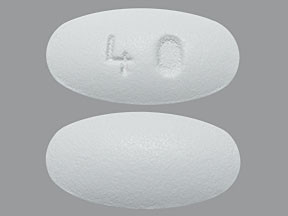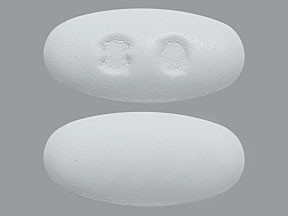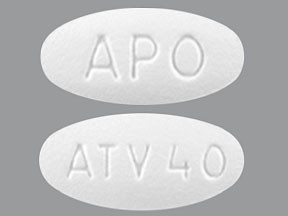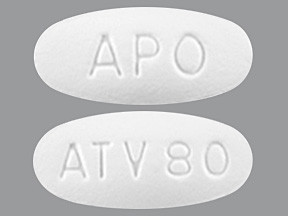ATORVASTATIN - ORAL
PHONETIC PRONUNCIATION: (a-TOR-va-STAT-in)
COMMON BRAND NAME(S): Lipitor
GENERIC NAME(S): atorvastatin calcium

Medically reviewed by Matt Sommers, PharmD. Last updated on September 01, 2023.
Uses
Atorvastatin Indications and Usage
Atorvastatin calcium tablets are indicated as an adjunct to diet for the treatment of elevated total cholesterol, LDL cholesterol, apolipoprotein B, and triglycerides in adults and pediatric patients aged 10 years and older with primary hyperlipidemia (including familial hypercholesterolemia) or mixed dyslipidemia. It is also indicated for the reduction of total cholesterol and LDL cholesterol in patients with homozygous familial hypercholesterolemia (HoFH), as an adjunct to other lipid-lowering treatments or if such treatments are unavailable. Atorvastatin calcium tablets are also indicated to reduce the risk of myocardial infarction, stroke, revascularization procedures, and angina in adult patients without clinically evident coronary heart disease but with multiple risk factors for coronary heart disease (such as age, smoking, hypertension, low HDL-C, or a family history of early coronary heart disease).
USES: Atorvastatin is used along with a proper diet to help lower "bad" cholesterol and fats (such as LDL, triglycerides) and raise "good" cholesterol (HDL) in the blood. It belongs to a group of drugs known as "statins." It works by reducing the amount of cholesterol made by the liver. Lowering "bad" cholesterol and triglycerides and raising "good" cholesterol decreases the risk of heart disease and helps prevent strokes and heart attacks. In addition to eating a proper diet (such as a low-cholesterol/low-fat diet), other lifestyle changes that may help this medication work better include exercising, losing weight if overweight, and stopping smoking. Consult your doctor for more details.
How to use ATORVASTATIN - ORAL
Atorvastatin Dosage and Administration
- Atorvastatin calcium tablets are taken orally once daily with or without food.
- LDL-C levels should be assessed when clinically appropriate, as early as 4 weeks after starting atorvastatin calcium, and the dosage should be adjusted if necessary.
- For adults, the recommended starting dosage is 10 or 20 mg once daily, with a dosage range of 10 mg to 80 mg once daily.
- Patients requiring a reduction in LDL-C of more than 45% may start at 40 mg once daily.
- Pediatric patients aged 10 years and older with heterozygous familial hypercholesterolemia (HeFH) should start with a dosage of 10 mg once daily, with a range of 10 mg to 20 mg once daily.
- Pediatric patients aged 10 years and older with homozygous familial hypercholesterolemia (HoFH) should start with a dosage of 10 mg to 20 mg once daily, with a range of 10 mg to 80 mg once daily.
- Dosage modifications may be necessary due to drug interactions.
HOW TO USE: Read the Patient Information Leaflet if available from your pharmacist before you start taking atorvastatin and each time you get a refill. If you have any questions, ask your doctor or pharmacist. Take this medication by mouth with or without food as directed by your doctor, usually once daily. The dosage is based on your medical condition, response to treatment, age, and other medications you may be taking. Be sure to tell your doctor and pharmacist about all the products you use (including prescription drugs, nonprescription drugs, and herbal products). Avoid eating grapefruit or drinking grapefruit juice while using this medication unless your doctor instructs you otherwise. Grapefruit can increase the amount of this medication in your bloodstream. Consult your doctor or pharmacist for more details. If you also take certain other drugs to lower your cholesterol (bile acid-binding resins such as cholestyramine or colestipol), take atorvastatin at least 1 hour before or at least 4 hours after taking these medications. These products can react with atorvastatin, preventing its full absorption. Take this medication regularly in order to get the most benefit from it. Remember to take it at the same time each day. It is important to continue taking this medication even if you feel well. Most people with high cholesterol or triglycerides do not feel sick. It is very important to continue to follow your doctor's advice about diet and exercise. It may take up to 4 weeks before you get the full benefit of this drug.
Side Effects
Possible Side Effects of Atorvastatin
-
Muscle Problems: Atorvastatin calcium tablets may cause muscle pain, tenderness, and weakness (myopathy). In some cases, muscle problems can be serious and lead to muscle breakdown and kidney damage. If you experience unexplained muscle pain, tenderness, or weakness, especially with a fever or increased fatigue, inform your doctor immediately.
-
Liver Problems: Atorvastatin calcium tablets can potentially affect your liver. It is important to have regular liver function tests before starting the medication and if you experience symptoms such as fatigue, nausea, loss of appetite, upper belly pain, dark urine, or yellowing of the skin or eyes, contact your doctor right away.
-
Increase in Blood Sugar Level: Atorvastatin calcium tablets may cause an increase in blood sugar levels. It is recommended to exercise regularly, make healthy food choices, and maintain a healthy body weight to manage blood sugar levels effectively.
-
Common Side Effects: The most common side effects of atorvastatin calcium tablets include nasal congestion, sore throat, runny nose, diarrhea, urinary tract infection, nausea, muscle spasms, throat pain, muscle and joint pain, pain in extremities, upset stomach, musculoskeletal pain, and trouble sleeping. If you experience side effects that persist or bother you, consult your doctor or pharmacist.
Please note that this is not an exhaustive list of side effects. If you have any concerns or experience any other symptoms while taking atorvastatin calcium tablets, it is advisable to consult your doctor for medical advice.
SIDE EFFECTS: Remember that your doctor has prescribed this medication because he or she has judged that the benefit to you is greater than the risk of side effects. Many people using this medication do not have serious side effects. A very small number of people taking atorvastatin may have mild memory problems or confusion. If these rare effects occur, talk to your doctor. Rarely, statins may cause or worsen diabetes. Despite these potential concerns, standard clinical practice guidelines suggest statin medications for all diabetic patients aged 40-75. Continue to monitor blood sugars as suggested by your doctor and talk with them about the benefits and risks of statin therapy if you have concerns about blood glucose specifically. Talk to your doctor about the benefits and risks. This drug may rarely cause muscle problems (which can rarely lead to very serious conditions called rhabdomyolysis and autoimmune myopathy). Tell your doctor right away if you develop any of these symptoms during treatment and if these symptoms persist after your doctor stops this drug: muscle pain/tenderness/weakness (especially with fever or unusual tiredness), signs of kidney problems (such as change in the amount of urine). This medication may rarely cause liver problems. If you notice any of the following rare but serious side effects, tell your doctor right away: yellowing eyes/skin, dark urine, severe stomach/abdominal pain, persistent nausea/vomiting. A very serious allergic reaction to this drug is rare. However, seek immediate medical attention if you notice any symptoms of a serious allergic reaction, including: rash, itching/swelling (especially of the face/tongue/throat), severe dizziness, trouble breathing. This is not a complete list of possible side effects. If you notice other effects not listed above, contact your doctor or pharmacist. In the US - Call your doctor for medical advice about side effects. You may report side effects to FDA at 1-800-FDA-1088 or at www.fda.gov/medwatch. In Canada - Call your doctor for medical advice about side effects. You may report side effects to Health Canada at 1-866-234-2345.
Precautions
Atorvastatin WARNINGS AND PRECAUTIONS
- Pregnancy: Pregnant patients and those who can become pregnant should be advised of the potential risk to a fetus. They should inform their healthcare provider if they are pregnant or suspect pregnancy to discuss whether atorvastatin calcium tablets should be discontinued.
- Postnatal Growth and Development Delay: Higher doses of atorvastatin calcium tablets (≥ 6 times the maximum recommended human dose) have been associated with delay in postnatal growth and development.
- Risk of Hemorrhagic Stroke: In a post-hoc analysis of a clinical trial, it was observed that patients on atorvastatin calcium 80 mg had a higher incidence of hemorrhagic stroke compared to placebo. The risk/benefit of using atorvastatin calcium 80 mg should be considered in patients with recent hemorrhagic stroke.
- Adverse Reactions: Important adverse reactions associated with atorvastatin calcium include myopathy and rhabdomyolysis, immune-mediated necrotizing myopathy, hepatic dysfunction, and increases in HbA1c and fasting serum glucose levels.
- Drug Interactions: Concomitant use of atorvastatin calcium with certain anti-viral medications, azole antifungals, or macrolide antibiotics may require additional recommendations. Please refer to the Drug Interactions section for more information.
- Carcinogenesis, Mutagenesis, Impairment of Fertility: Studies have shown rare tumors in muscle and liver in animal studies at high doses of atorvastatin calcium. Atorvastatin was not found to be mutagenic or clastogenic in various tests. In female rats, atorvastatin did not cause adverse effects on fertility, while in male rats, it had no significant impact on fertility except for some changes in the reproductive organs at high doses.
Please note that the above information is a summary of the relevant sections in the document and should not be considered as comprehensive medical advice.
PRECAUTIONS: Before taking atorvastatin, tell your doctor or pharmacist if you are allergic to it; or if you have any other allergies. This product may contain inactive ingredients, which can cause allergic reactions or other problems. Talk to your pharmacist for more details. Before using this medication, tell your doctor or pharmacist your medical history, especially of: liver disease, kidney disease, alcohol use. Before having surgery, tell your doctor or dentist about all the products you use (including prescription drugs, nonprescription drugs, and herbal products). Limit alcoholic beverages. Daily use of alcohol may increase your risk for liver problems, especially when combined with atorvastatin. Ask your doctor or pharmacist for more information. Older adults may be more sensitive to the side effects of this drug, especially muscle problems. This medication must not be used during pregnancy. Atorvastatin may harm an unborn baby. Therefore, it is important to prevent pregnancy while taking this medication. Consult your doctor for more details and to discuss the use of reliable forms of birth control (such as condoms, birth control pills) while taking this medication. If you become pregnant or think you may be pregnant, tell your doctor right away. Because of the possible risk to the infant, breast-feeding while using this drug is not recommended. Consult your doctor before breast-feeding.
Interactions
DRUG INTERACTIONS: See also How to Use section. Drug interactions may change how your medications work or increase your risk for serious side effects. This document does not contain all possible drug interactions. Keep a list of all the products you use (including prescription/nonprescription drugs and herbal products) and share it with your doctor and pharmacist. Do not start, stop, or change the dosage of any medicines without your doctor's approval. Some products that may interact with this drug include: gemfibrozil, telaprevir, ritonavir. Other medications can affect the removal of atorvastatin from your body, which may affect how atorvastatin works. Examples include colchicine, telithromycin, certain azole antifungals (such as itraconazole, ketoconazole, posaconazole), among others. Do not take any red yeast rice products while you are taking atorvastatin because some red yeast rice products may also contain a statin called lovastatin. Taking atorvastatin and red yeast rice products together can increase your risk of serious muscle and liver problems.
-
Drug Interactions that may Increase the Risk of Myopathy and Rhabdomyolysis with Atorvastatin Calcium: There are certain drugs, such as cyclosporine, gemfibrozil, and anti-viral medications, that can increase the risk of myopathy and rhabdomyolysis when used concomitantly with atorvastatin calcium.
-
Drug Interactions that may Decrease Exposure to Atorvastatin Calcium: Rifampin, an inducer of cytochrome P450 3A4 and inhibitor of OATP1B1, can lead to variable reductions in plasma concentrations of atorvastatin calcium when used together.
-
Atorvastatin Calcium Effects on Other Drugs: The use of atorvastatin calcium can affect the exposure of other drugs, such as cyclosporine, digoxin, oral contraceptives, and warfarin. It is important to consider these interactions when prescribing atorvastatin calcium.
Overdose
OVERDOSE: If someone has overdosed and has serious symptoms such as passing out or trouble breathing, call 911. Otherwise, call a poison control center right away. US residents can call their local poison control center at 1-800-222-1222. Canada residents can call a provincial poison control center.
Images
Reviews
Faq for ATORVASTATIN - ORAL
Atorvastatin is used to lower cholesterol levels in the blood and to reduce the risk of heart attack, stroke, and other cardiovascular complications in individuals with high cholesterol.
Atorvastatin works by blocking an enzyme called HMG-CoA reductase, which is responsible for the production of cholesterol in the liver. By inhibiting this enzyme, Atorvastatin helps to decrease the levels of LDL (bad) cholesterol in the blood.
The recommended starting dose of Atorvastatin for most adults is 10-20 mg once daily. However, the dosage may be adjusted based on individual response and specific medical conditions.
Common side effects of Atorvastatin may include muscle aches, joint pain, headache, stomach pain, nausea, and diarrhea. It is important to report any unusual or severe side effects to your healthcare provider.
Certain medications may interact with Atorvastatin and affect its effectiveness or increase the risk of side effects. It is important to inform your healthcare provider about all the medications, supplements, and herbal products you are taking before starting Atorvastatin.
Atorvastatin may start to show its cholesterol-lowering effects within 2 weeks, but it may take up to 4 weeks for the full benefits to be seen. Regular monitoring of cholesterol levels by a healthcare professional is usually recommended.
Atorvastatin is not recommended for use during pregnancy as it may harm the unborn baby. It is important to discuss the potential risks and benefits with your healthcare provider if you are pregnant or planning to become pregnant.
Moderate alcohol consumption is generally considered acceptable while taking Atorvastatin. However, excessive alcohol intake may increase the risk of liver damage and can counteract the cholesterol-lowering effects of the medication.
In rare cases, Atorvastatin may cause muscle problems such as myopathy or rhabdomyolysis, which can lead to muscle pain, weakness, and potentially life-threatening complications. It is important to promptly report any unexplained muscle pain or weakness to your healthcare provider.
Disclaimer
IMPORTANT: HOW TO USE THIS INFORMATION: This is a summary and does NOT have all possible information about this product. This information does not assure that this product is safe, effective, or appropriate for you. This information is not individual medical advice and does not substitute for the advice of your health care professional. Always ask your health care professional for complete information about this product and your specific health needs.




No Reviews Yet